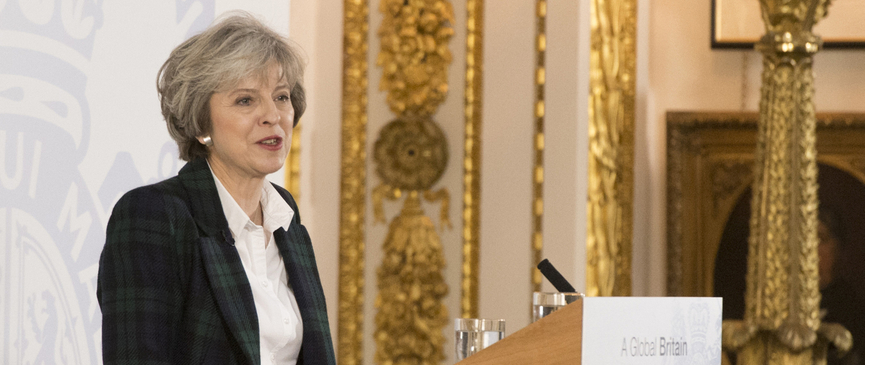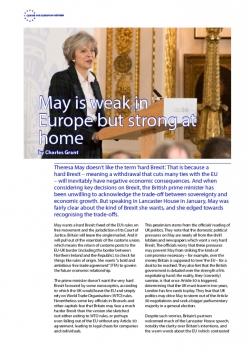
May is weak in Europe but strong at home
The EU-27 fear domestic politics will drive Britain towards a very hard Brexit. But Theresa May is strong enough at home to resist such pressures, if she wishes to.
Theresa May doesn’t like the term ‘hard Brexit’. That is because a hard Brexit – meaning a withdrawal that cuts many ties with the EU – will inevitably have negative economic consequences. And when considering key decisions on Brexit, the British prime minister has been unwilling to acknowledge the trade-off between sovereignty and economic growth. But speaking in Lancaster House in January, May was fairly clear about the kind of Brexit she wants, and she edged towards recognising the trade-offs.
May wants a hard Brexit: freed of the EU’s rules on free movement and the jurisdiction of its Court of Justice, Britain will leave the single market. And it will pull out of the essentials of the customs union, which means the return of customs posts to the EU-UK border (including the border between Northern Ireland and the Republic), to check for things like rules of origin. She wants "a bold and ambitious free trade agreement" (FTA) to govern the future economic relationship.
The prime minister doesn’t want the very hard Brexit favoured by some eurosceptics, according to which the UK would leave the EU and simply rely on World Trade Organisation (WTO) rules. Nevertheless some key officials in Brussels and other capitals fear that Britain may face a much harder Brexit than the version she sketched out: either exiting to WTO rules, or perhaps even falling out of the EU without any Article 50 agreement, leading to legal chaos for companies and individuals.
This pessimism stems from the officials’ reading of UK politics. They note that the domestic political pressures on May are nearly all from the shrill lobbies and newspapers which want a very hard Brexit. The officials worry that these pressures may prevent May from striking the kinds of compromise necessary – for example, over the money Britain is supposed to ‘owe’ the EU – for a deal to be reached. They also fret that the British government is deluded over the strength of its negotiating hand; the reality, they (correctly) surmise, is that once Article 50 is triggered, determining that the UK must leave in two years, London has few cards to play. They fear that UK politics may drive May to storm out of the Article 50 negotiations and seek a bigger parliamentary majority in a general election.
Given the weakness of the UK's cards, a half-decent deal requires the goodwill of Britain's partners
Despite such worries, Britain’s partners welcomed much of the Lancaster House speech, notably the clarity over Britain’s intentions, and the warm words about the EU (which contrasted with Donald Trump’s rudeness). What they didn’t like was the suggestion that Britain’s FTA could "take in elements of current single market arrangements" for the car industry and financial services. The 27 considered that idea ‘cherry-picking’, believing that the single market should be all-or-nothing. Nor did they like May’s comment that if the EU offered a punitive deal, the UK would walk away and turn its economic model into something akin to Singapore’s.
The most alarming passage in the speech was the pledge to negotiate within two years, not only the Article 50 agreement, but also the FTA and everything else required to govern future relations on security, research, migration, energy and so on. Britain’s partners think that is bonkers. Especially since there will only be about a year for real negotiations, between the formation of a new German government towards the end of this year and the need to start the process of European Parliament ratification of the divorce deal in late 2018. FTAs normally take at least five years to negotiate and several more to ratify.
Yet some UK officials say that with "bold ambition" and "political will" anything is possible. They say that because EU and UK rules are already aligned, an FTA can be sorted out quickly. Britain’s partners beg to differ, pointing out that its desire to be able to change the rules, its determination to retain access to services markets, and the need to cover sensitive issues like state aid and competition policy, will make the negotiations fiendishly complex.
If all goes well, the 27 believe, two years could allow the completion of both the Article 50 deal and a sketch of the future relationship in a political declaration. The details of the FTA and everything else that will cover future relations could then be negotiated during what May termed the ‘implementation phase’, after Britain has left the EU. But the fact that May proclaimed that everything could be done in two years makes Britain’s partners worry that Downing Street is not fully in touch with reality. They wonder if, following the departure in January of Britain’s gloomy but realistic EU ambassador, Sir Ivan Rogers, there remain enough officials willing to speak uncomfortable truths to power.
The British may over-estimate the strength of the cards they hold. The strongest card – repeatedly mentioned by May in her speech – is Britain’s contribution to European security, via co-operation on policing, intelligence, defence and foreign policy. Any attempt by Britain to say "we are helping to defend you, therefore give us a good trade deal" would be viewed as cynical and damage Britain’s reputation. But handled deftly, Britain’s contribution on security could help to generate goodwill.
A related card cited by British officials is Donald Trump. His questionable commitment to European security, and the increasingly dangerous nature of the world, could make partnership with Britain more valuable to continental governments. But the Trump card could easily end up hurting the British. The more that British ministers cosy up to Trump and avoid criticising his worst excesses, and the more the president’s pronouncements on issues such as trade, climate, NATO, Palestine, Iran and Russia reveal a worldview far from that of the Europeans (including the British), the more alien the British appear to other Europeans, and the more their soft power erodes.
The British try to play the City of London as another card, claiming that it adds value to the entire European economy. Therefore, they say, the 27 should give the City a special deal, so that its firms can continue to do business across the EU. This British argument has some basis in reality, but few EU governments view the City as a European jewel whose sparkle should be preserved. Some view it as a cesspit of wicked Anglo-Saxon capitalism, while others are keen to pick up the business that could leave the City post-Brexit.
May’s threat in Lancaster House to turn Britain into an ultra-liberal economy is a card that lacks credibility, given that in the same speech she spoke in favour of employee rights, workers on boards, industrial strategy and a fairer society. There is no majority in the Conservative Party or the country at large for creating a low-tax, low-regulation economy.
Given the weakness of these cards, a half-decent deal will require the goodwill of Britain’s partners. And that means that May and her ministers should conduct the talks in a sober, courteous and modest manner. She will help to foster a positive atmosphere if she seeks a relatively soft Brexit in some key domains, for example by going for modest restrictions on free movement, or intense co-operation on security.
Some of the 27 are sceptical that the British political context will permit May to veer in a softer direction. But in fact May’s political position is strong: the Labour Party is weak and divided, while hard-line Tory europhobes have been partially disarmed by her pledges in Lancaster House. However weak May’s hand may be in Europe, in the UK she is probably in a stronger position than she herself realises.
Charles Grant is director of the Centre for European Reform.

